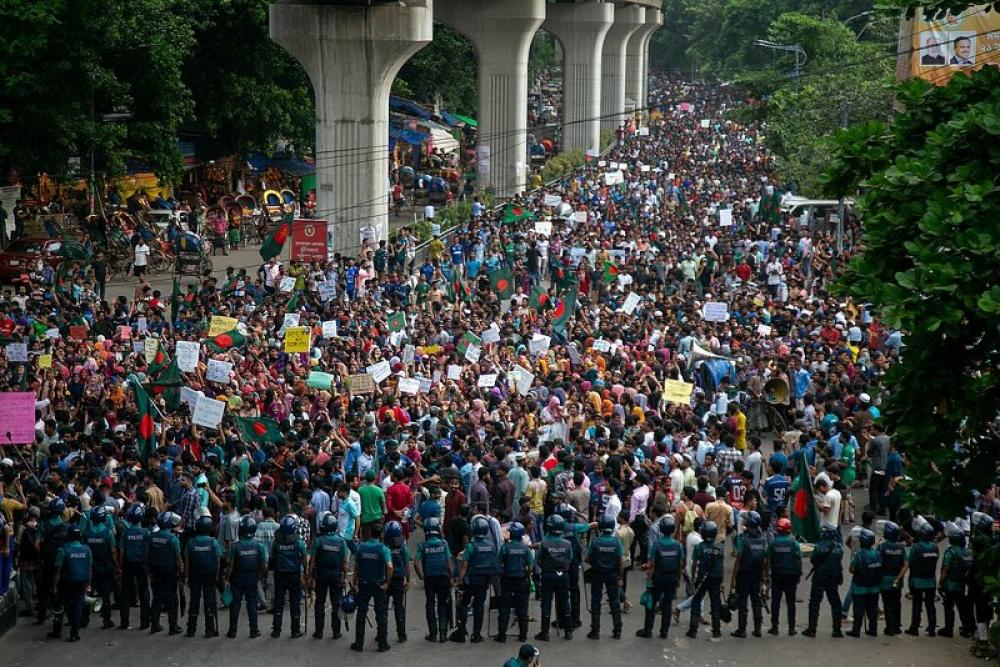Just Earth News | @justearthnews | 30 Jul 2024, 08:52 am Print
 Bangladesh
Bangladesh Photo Courtesy: Wikimedia Commons/ Rayhan9d/ShareAlike 4.0 International
Fears of fresh unrest stare at Bangladesh after weeks of a deadly showdown between students and political opponents and the Sheikh Hasina government forces over the job quota system even as the United Nations asked for an impartial probe into the country's worst turmoil since the formation of the country in 1971 over countless human sacrifices.
UN chief Antonio Guterres has asked authorities in Bangladesh to promptly, transparently, and impartially investigate all acts of violence in the country in recent times that paralysed normal life in the South Asian nation.
Stéphane Dujarric, spokesman for the UN Secretary-General, said: "The Secretary-General remains deeply concerned about the situation in Bangladesh. He notes reports of the resumption of student protests today and reiterates his call for calm and restraint."
"The Secretary-General is concerned about reported mass arrests of thousands of young people and political opposition in connection with the current student movement,"Stéphane Dujarric said.
Guterres underscored the importance of due process and the right to freedom of expression and the right to peaceful assembly.
"He is also alarmed by emerging reports about the excessive use of force by security forces and credible evidence of human rights violations. He reiterates his call for all acts of violence to be investigated promptly, transparently, and impartially, and for those responsible to be held to account," he said.
Bangladesh witnessed one of the deadliest protests over job quota issues claiming at least 150 lives. According to media reports, there are possibilities of fresh protests as a section of students gave a call for fresh agitation.
Fresh protest call was issued despite six of the student coordinators announcing before the media the withdrawal of the movement. The students alleged that the withdrawal was obtained under duress in police custody.
The protest initially began across colleges and universities but soon spiralled into a national agitation and left several people injured.
Security forces cracked down which led to curfew and army patrols on the streets of the national capital. The Internet was suspended for days in Bangladesh amid widespread violence and clashes between protesters and security forces.
The mobile and internet connectivity was unblocked on Sunday, ending the near blackout phase which left Bangladesh nearly shut for 11 days.
Authorities have also increased the day time period of the curfew inorder to help businessmen.
This was the first violent protest that occurred in the country since Prime Minister Sheikh Hasina formed the government for another term after winning the recent general polls in January.
According to reports, the protest could cost the developing nation's economy $10 billion, a hurdle to the country's future progress.
The curfews and internet shutdown to quell a student protest over a government jobs quota is estimated to have a $10 billion impact on the economy and costs are expected to climb further, Zaved Akhtar, president of the Foreign Investors’ Chamber of Commerce and Industry, told Bloomberg.
“While the country is slowly recovering with limited online and physical connectivity, full operations are yet to come back, and we are at best 50% of the economic potential,” Akhtar said.
Several experts said the situation in Bangladesh still remained tense.
Questioning the government's action against protesters, Professor Nazmul Ahsan Kalimullah, a political commentator in Bangladesh, told The New Indian Express: "It is an impasse situation, the party in power and the government are trying to quell the movements – using police, rapid action battalion and armed forces. My student, Abu Syed, 25, fell to their bullets. The situation is tense even now as on the pretext of 'block raids' young people are being rounded up and put under detention in cells."
Another activist blamed the current Bangladeshi government for the current situation and said it was not 'legitimate'.
Pinaki Bhattacharya, exiled Bangladesh blogger and human rights activist, told the Indian newspaper: "Our statistics (we have the entire list) confirms that 266 people have died during these protests. We don’t consider the present government as legitimate. They are maintaining power through brutal force which has led to gross human rights violations. The opposition too has been silenced. From being a mere student protest this is soon turning into a revolution against the government."
Sheikh Hasina, the longest-serving PM of the country, blamed the opposition for capitalising on the situation and carrying out deadly attacks in the country.
Stipulating that 93 percent of recruitments will be on merit now, Bangladesh Supreme Court this month scrapped most of the quotas in government jobs which had led to massive protests.
- Mexico in chaos: Army kills infamous cartel boss ‘El Mencho’
- US: Armed intruder shot dead after breaching Trump’s Mar-a-Lago Security. What we know so far?
- Trusted ride turns terrifying: UK taxi driver jailed for 9 years for raping sleeping passenger
- Border on fire: Dozens of Afghan civilians killed as Pakistan launches airstrikes
- Anthropic unleashes Claude Code Security to find critical bugs in code





-1763561110.jpg)
